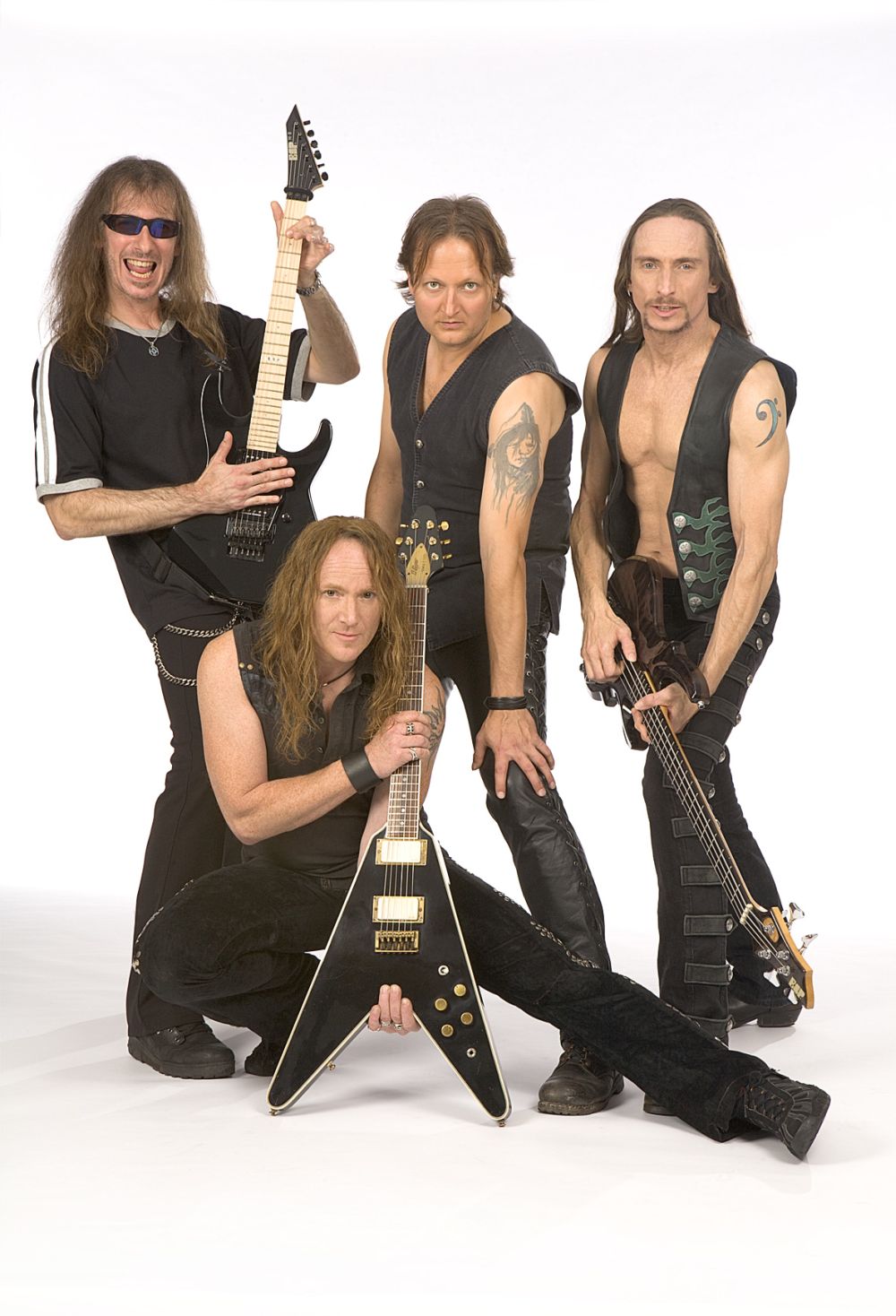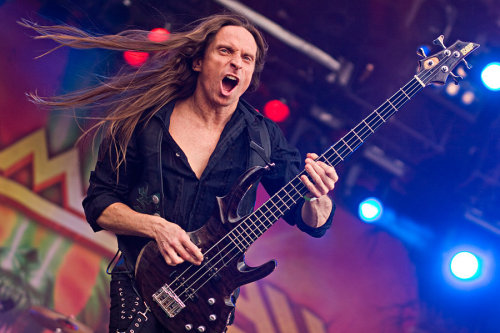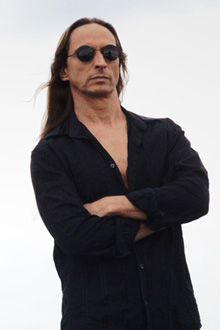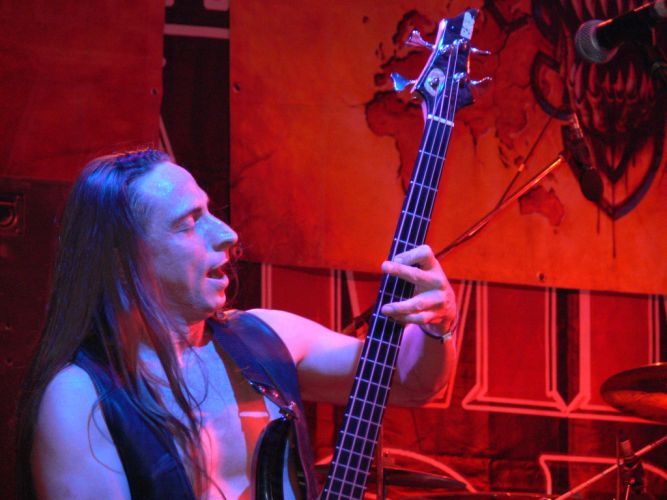
Gamma Ray is a unique band. I believe it has a little of everything in there for everyone. I'm hearing a symphonic, speed, power metal band with influences of old-school heavy metal. Powerplant and Empire of the Dead are tied for me as the best albums. I found them heavier than the other albums. I think its important too for bands to try to fit their heaviness into todays modern world and Empire of the Dead does that well.
 ** First big question: When can we expect a new Gamma Ray album?
** First big question: When can we expect a new Gamma Ray album?
# We will start working and recording for the next album February/March next year. Depending on how fast we will be and how many songs everybody brings in when we start playing together, the new album will be released before or after the summer. Touring will start after the summer anyway, because Kai will be also playing Festivals with Helloween in summer 2019.
** No more than two years has been going by between albums since 1990 but this time its been three going on four. What's going on?
# We are getting old, haha - there’s several reasons for this - we were too busy with touring and festivals (which is nowadays economically better than doing albums - which is another story;-)) - we had to move with our studio, rehearsal room and storage - Kai was doing Unisonic with Michael Kiske and so on...
** You've been in Gamma Ray for almost thirty years! Tell us exactly when you first joined up. What's kept you staying? How's it been being in Gamma Ray?
# Well, I first joined up during the Heading for Tomorrow production in 1989. Since we started to work in our own studio 1993, I enjoyed this freedom of spending as much time as you want for creating what you want. No one ever told us what we should do. It was a real band thing. Of coarse we internally discussed a lot about how we should do this and how should sound that (mainly Kai and me, haha). Same on stage. This kind of spirit of freedom in our work is really special and kept me going all the years.
** How/why were you approached to play bass on two songs from Gamma Ray's first studio album Heading for Tomorrow? Uwe Wessel was already the bass player at that time.
# Uwe Wessel was first only hired for the pre and studio production of Heading for Tomorrow and Kai wanted me to be the bass player on the first tour. He said it would be good that my name appeared on the first album and therefore I played bass on the song “Money". A song we already played together during that course of popular music at the university in Hamburg. That little slap overdub on “The Silence” was an idea of Thommy Newton (who took over and finished the production of HfT) after he saw me fuzzing’ around on my bass.
 ** You started in your permanent role as a member of Gamma Ray playing lead guitar on two songs, "Heaven Can Wait" and "Who Do You Think You Are?" on the bands first EP, and played lead guitar right up until the 1995 live album Alive. Why did you switch from bass after the first album to lead guitar duties, and why the switch from lead guitar to bass duties starting with the 1996 Silent Miracles EP?
** You started in your permanent role as a member of Gamma Ray playing lead guitar on two songs, "Heaven Can Wait" and "Who Do You Think You Are?" on the bands first EP, and played lead guitar right up until the 1995 live album Alive. Why did you switch from bass after the first album to lead guitar duties, and why the switch from lead guitar to bass duties starting with the 1996 Silent Miracles EP?
# Uwe Wessel’s own band split up during the HfT production, so he wanted to stay in GRay. On the other side Kai recorded tons of guitar overdubs on all the songs and it was quite impossible to do this live on stage with just one guitar player, like it was originally planned. So I grabbed the guitar, learned and practiced all the songs. I was so much into that energy of the GRay songs, that I did not care whether I play bass or guitar at that time. Some years later something was missing and I found out that the bass is my heart instrument ;-)
** What does 2018 and beyond hold for Gamma Ray?
# I’d really like to know that too ;-) Well, Kai confirmed exclusivity for the Pumpkins United thing until the end of 2018. So nothing will happen in 2018, besides some composing which every member of GRay separately does. Then >> my answer to Your first big question ;-)
 PRODUCER
PRODUCER
** According to your website, http://www.bassman. one/, you also produce, mix, and master music. Is your studio an in-home studio or is it separate from your house? What is the name of your studio and how can people find out more about it?
# I don’t run a complete recording studio anymore, since the Hammer Studios burned down end of 2013. When somebody wants to work with me, I’ll do it in any studio and this extremely depends on what kind of music it is an how big the production shall be. My studio is only a - like you call it - in-home studio and I need to think about a name for it ;-) For bigger recordings I go to bigger studios here in Cancun and in Hamburg I normally work in the Chameleon Studios.
BASS TALK
A. Is it hard to find a decent, left handed bass? Is it true that most left handed bassists who play a six-string play custom made basses?
# As I’m a right hand player I don’t know much about this matter. I rarely use a 5 string bass, but I hate 6 string basses (You just cant’t rock on them).
With the standard basses it is like this: You walk into a music store and there is maybe 10 Fender style Jazz basses - maybe 2 fit your requests, 3 are OK and the rest is just straight blah;-) Then there is 2 lefties and you can really be lucky if one of them is cool. If it comes to 6 string basses you better go directly for the personally custom made ones.
B. What's your favorite brand of bass, amps, strings (brand name, regular or steel), pedals, and pick-ups?
# Woof - talking (or writing) about gear can easily fill a book. And it also extremely depends on the music you are playing. For a decent metal bass sound I use stainless steel strings such as D’Addarío Pro Steels or Dean Markley Blue Steel. Seymour Duncan Quarter Pound pickups do a very good Job in combination with an active tone control. For the slower and mid tempo songs I really like my Mexican Fender Precision. For the faster songs I prefer the ESP RD 380 (24 fret modern jazz bass - Japanese model) There is a lot of good amps out there, but on the last two GRay tours I was really happy with the ENGL Bass Rackhead E1060 which is actually 2 amps in one and very versatile. In combination with the E410B cabinets it was a killer stack. I don’t use a lot of pedals, as they all kill a little bit of the punch (especially the digital ones) - sometimes a chorus like the Boss Bass Chorus CE-2b or an old Ibanez CS 9, rarely an octaver like the EBS Octabass or the MXR M288 Bass Octave Deluxe pedal.
 C. What suggestions could you give on minimizing blisters on fingers from playing? Do they have things you can put on your fingers to prevent that?
C. What suggestions could you give on minimizing blisters on fingers from playing? Do they have things you can put on your fingers to prevent that?
# Right hand blisters from intense finger playing (practicing): 1. Stop practicing/playing when you recognize them. Open them (but don’t cut off all the skin of the blister) 3: let the skin underneath dry and get thicker again before you start playing again - this normally not more than 2 days. If you have to play a show and can’t wait you need to tape it for the show. Well, maybe some blood running down your bass fits into the show - then don’t tape it.
On the left hand you normally don’t get blisters, unless you do a lot of sliding up and down your strings. Especially some stainless steel strings like the Pro Steels with their rough finish/surface can cause blisters. As bass strings due to their size don’t cut and wreck your skin all the time like guitar strings this will not happen very often. If you are not stupid you learn pretty soon when to stop practicing or how to modify your technic.
D. What is the difference between picking and plucking on a bass? What purpose does "slapping" the bass serve? Does it provide a certain sound?
# This means playing / hitting your strings with your fingers or with a pick. All these technics (Picking, plucking, slapping, thumb slapping) produce a certain sound and also a certain groove. I will not describe every sound and groove here because you can find hundreds of examples on YouTube ;-)
I think that it’s important to be able to play with fingers AND with a pick to be a versatile bass player. Slapping and thumb slapping is maybe not so important in metal music, but I enjoy bringing it in here and there.
** TIDBITS
** Obviously you play bass most of the time, but your guitar playing skills are equally impressive! What do you do to hone your skills on lead guitar now that you've been playing bass for Gamma Ray?
I play guitar a lot when I’m composing and I normally do some guitar worx in studio productions.
A. What advice would you give to people just starting out to play bass? What about people who want to someday be on a professional level ?
# If you do it for fun and for having some good times with other musician friends - go ahead and spend as much time as you can with it.
On the professional side this is nowadays totally different - bass players are not needed in many commercial and Popmusic studio productions, because the bass is mainly programmed as the drums are too. Well, this does not mean that is impossible to make it on a professional level, but it’s definitely hard to survive. I can only advise you - better do something else ;-)
 B. Where can people find you on social media?
B. Where can people find you on social media?
# Actually I’m only on LinkedIn and I’m not really using it. Sometimes a little and sometimes less. I always wonder how people manage to find the time to take care of 3, 4 or 5 platforms.
C. Has the artist for your album cover art always been the same since Gamma Ray was formed?
# No, it has been many. I think since the No World Order album we’re only working with Hervé Monjeaud (not 100% sure about that - I always cared more about the “audio” part in our productions ;-))
D. Have you ever broken a string while playing on stage?
# Yes, of course. But this normally happens only with cheap or badly produced strings. Or the strings are too old. I change my strings at least every two shows on a tour, so they’re never too old on stage;-). Some bass players use very hard and thick picks. This can partly increase the tension of the strings and they break more often. My choice is nylon picks .88; they’re more elastic, don’t wreck the strings and most important - they groove a lot better. To sum it up: With a good set of strings - I don’t break them :-)
** What were you doing before joining Gamma Ray?
# I played in some local cover bands, worked in a music store, worked as a technician in a live club and as electrician on construction until I did this compact course of popular music at the university in Hamburg. Kai Hansen also was doing that course and there we met. Then GammaRay kicked off.
** Any favorite hobbies, foods, movies, books? What do you do on your downtime?
# I don’t have much of a downtime (family man, haha). I barely manage to go to the gym 2 times a week. My hobby is playing/learning congas, but at the moment there’s not much time for this (for example now I have to answer this interview;-)) I love GOOD food, science fiction movies and documentaries and my favourite book is still Brave New World by Aldous Huxley.
Interview by Heather Williams
Answers by Dirk Schlachter
June 2018